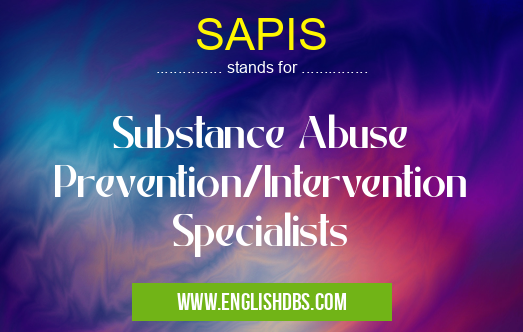What does SAPIS mean in HEALTHCARE
Substance abuse is a growing problem in the United States. It is important to understand the causes and develop strategies to prevent and intervene when substance abuse becomes an issue. Substance Abuse Prevention/Intervention Specialists (SAPIS) are professionals trained in substance abuse prevention, assessment, intervention, and aftercare services in order to work with individuals who suffer from substance use disorders. SAPIS are trained to work with clients of all ages in a range of settings including schools, hospitals, mental health centers, residential programs, and correctional facilities. SAPIS provide counseling, case management services, crisis intervention, referrals to support groups and other specialty treatment providers. These specialists use evidence-based practices such as cognitive behavioral therapy (CBT) to help clients identify goals for recovery and develop strategies for overcoming challenges associated with addiction.

SAPIS meaning in Healthcare in Medical
SAPIS mostly used in an acronym Healthcare in Category Medical that means Substance Abuse Prevention/Intervention Specialists
Shorthand: SAPIS,
Full Form: Substance Abuse Prevention/Intervention Specialists
For more information of "Substance Abuse Prevention/Intervention Specialists", see the section below.
» Medical » Healthcare
What Does SAPIS Stand For?
SAPIS stands for Substance Abuse Prevention/Intervention Specialists. These professionals specialize in helping individuals struggling with addiction by using specialized techniques such as cognitive behavioral therapy that have been proven effective in treating this condition. SAPIS provide individualized treatment plans tailored to each client’s unique situation and needs. They may help clients set realistic goals for recovery and provide guidance on how best to cope with triggers that could lead to relapse or further problems caused by substance abuse. In addition, SAPIS can also provide referrals both within the medical system or community resources that can further assist their client's progress towards living a clean lifestyle free from drugs or alcohol.
Essential Questions and Answers on Substance Abuse Prevention/Intervention Specialists in "MEDICAL»HEALTHCARE"
What is a Substance Abuse Prevention/Intervention Specialist?
A Substance Abuse Prevention/Intervention Specialist (SAPIS) is an individual who specializes in working with individuals and communities to prevent and reduce substance abuse through assessment, intervention, education, and referral services. The goal of SAPIS is to create environments where individuals are empowered to make healthy lifestyle choices at both the individual and social levels.
What types of services do SAPIS provide?
SAPIS provide a variety of prevention and intervention services that include, but are not limited to, crisis management and accountability strategies, information dissemination on current trends in substance abuse, outreach programming for high-risk populations, development of comprehensive treatment plans for individuals at risk of developing substance use disorders, consultation with other organizations such as schools and criminal justice systems, case management for those already receiving services, research evaluation activities related to prevention and intervention initiatives.
What qualifications does someone need to become a SAPIS?
To become a SAPIS it's necessary to have the right educational background as well as experience in the field. Most professional positions require at least a bachelor's degree in psychology or a related field such as social work or counseling. Professional certifications can also be beneficial when looking for positions in substance abuse prevention/intervention settings.
How do I get help from a SAPIS?
There are many ways you can get help from a SAPIS depending on your individual needs. If you want to talk about your own substance use disorder or that of someone you know or care about you should first contact your local mental health center or addiction treatment facility for more information about available services. Additionally, many community agencies offer free counseling sessions with certified SAPIS providers which can be accessed through referrals from social service providers or via online searches.
What can I expect during my consultation with a SAPIS?
During your consultation with a SAPIS they will typically ask questions about your personal history with drugs and alcohol (past or present). Additionally they may inquire about family dynamics, school performance, employment history or extracurricular activities that could have put you at risk for developing substance use disorders. Ultimately the goal is to identify any potential warning signs before they develop into full-blown addictions so that steps can be taken early on to prevent further progression.
Is there any cost associated with consulting with a SAPIS?
Many community organizations offer free generic consultations with certified professionals who specialize in providing support for those dealing with addiction issues. However if you wish to access one-on-one counseling sessions or more specialized services then fees may apply depending on the service provider as well as the severity of your condition.
Is the advice provided by SAPIS confidential?
Yes all advice provided by qualified professionals during consultations should remain confidential unless there is an immediate threat to an individual’s safety or security due to their substance use disorder. If this is suspected then only necessary information will be shared amongst responsible authorities such as law enforcement personnel if deemed appropriate by the treating provider.
Is it possible for me to receive long-term support after consulting with a Sapis?
Yes it is possible for you receive ongoing support when engaging in consultations with Sapis practitioners as many offer follow up visits after initial assessments have been conducted and goals established during initial meetings have been pursued.
Final Words:
Substance Abuse Prevention/Intervention Specialists (SAPIS) are vital members of a team dedicated to providing comprehensive care for those suffering from addiction issues. These professionals use evidence-based practices such as cognitive behavioral therapy (CBT) to help clients identify goals for recovery and develop strategies for overcoming challenges associated with addiction. By working together with other medical staff such as psychologists, psychiatrists, social workers and other counselors these specialists can create tailor made treatment plans unique to each client’s individual needs which promotes long-term success towards sobriety while also giving them the tools necessary to cope when faced with especially difficult times.
